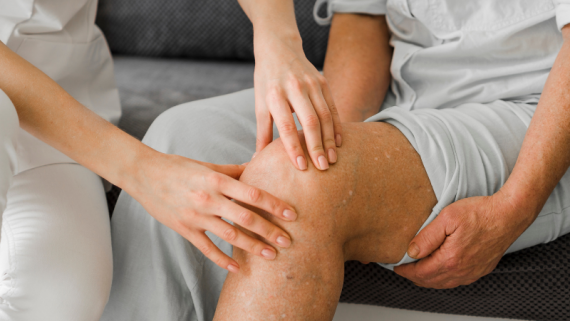Winter can be a challenging season for seniors, especially those dealing with chronic knee pain. The drop in temperature often intensifies joint discomfort, limiting mobility and affecting daily life. Understanding the causes, taking preventive measures, and exploring non-surgical treatment options can help seniors stay pain-free. With insights from knee pain consultant in Kolkata, Dr. Krishna Poddar, let’s explore how to manage knee pain effectively during winter. Causes of Winter Knee Pain in Seniors
- Cold-Induced Stiffness Low temperatures can cause muscles and joints to stiffen, reducing flexibility and increasing discomfort in the knees.
- Barometric Pressure Changes A drop in barometric pressure before cold weather can cause tissues in the knee to expand, putting pressure on nerves and leading to pain.
- Reduced Physical Activity Seniors tend to stay indoors during winter, reducing their activity levels. This inactivity can weaken the muscles supporting the knees, exacerbating pain.
- Existing Conditions Chronic conditions like osteoarthritis or rheumatoid arthritis often worsen during winter due to inflammation and decreased circulation.
As we age, our bodies naturally undergo changes that affect mobility and overall joint health, with the knees being one of the most common areas to experience discomfort. Knee Pain in Aging Adults can arise due to wear and tear, reduced flexibility, and conditions like osteoarthritis. This can severely impact the quality of life for older adults, limiting their ability to perform everyday activities. However, there are various ways to manage and reduce knee pain to ensure better mobility and comfort. In this blog, we will explore how aging affects knee health and provide practical tips for managing knee pain in older adults. How Aging Impacts Your Knee Health Aging plays a significant role in joint health, particularly in the knees. Several factors contribute to increased knee pain in older adults, including: Joint Degeneration: Over time, the cartilage in the knee wears down due to constant use. This degeneration reduces the cushioning between bones, leading to pain, stiffness, and inflammation. Osteoarthritis: A common age-related condition, osteoarthritis causes the gradual breakdown of joint cartilage, resulting in pain and reduced flexibility in the knees. Weakened Muscles: As we age, muscle mass naturally declines, leading to weaker muscles around the knees. This can affect the stability and strength of


